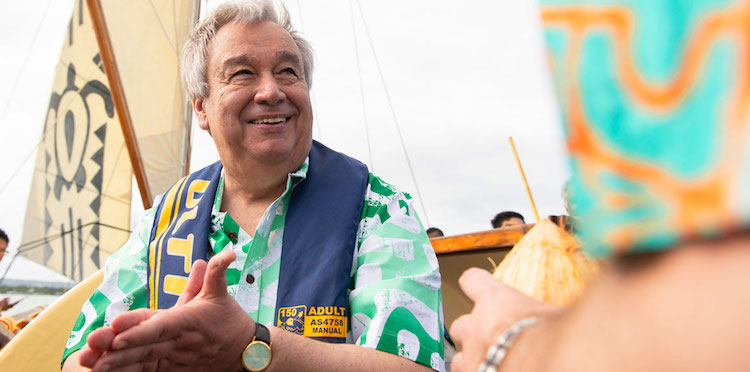
By Sean Buchanan
NEW YORK (IDN) – Like many of the world’s low-lying islands, Tuvalu, the South Pacific island whose highest point is less than five metres above the waves, faces the threat of being submerged under rising seas.
“We must stop Tuvalu from sinking and the world from sinking with Tuvalu,” UN Secretary-General António Guterres said in a tweet posted during a recent trip to the South Pacific.
Pointing out that Tuvalu is “on the extreme frontlines of the global climate emergency,” he noted that “rising seas threaten to drown this island nation – a sign of what’s in store for us all.”
At a joint press conference on May 17 with Tuvalu’s Prime Minister, Enele Sosene Sopoaga, the UN chief told journalists: “You are on the frontline of the war on climate change because climate change is striking in Tuvalu in a more dramatic way than anywhere else in the world.”
He praised the island nation for having “decided to resist” and implement a “programme of adaptation and resilience that is something that the whole world should admire and support.”
Guterres expressed his “deep solidarity” and the UN’s “total support” to the government and people of Tuvalu in their determined efforts to preserve their country – “physically, culturally, in the economic and social dimensions, as a rich component of the Pacific and the international community”.
“Nowhere have I seen the heartbreaking impacts of the global climate emergency more starkly than in Tuvalu, where I met families whose homes are threatened by relentless rising seas,” he said.
Guterres called on “governments that are still causing the problems that affect Tuvalu” to understand that they need to change energy and transportation policies, along with the way they manage their cities and use fossil fuels “so that the impact of climate change on Tuvalu can be stopped”.
“Climate change cannot be stopped in Tuvalu, it has to be stopped in the rest of the world”, he emphasised, noting that he will host the 2019 Climate Action Summit in New York “to make sure that all countries accept the commitment that we need to be globally carbon neutral by 2050 to limit the increase in temperature to 1.5 degrees”.
Guterres was in Tuvalu after visiting Fiji where he noted that it was the first small island State to preside over the UN Framework Convention on Climate Change (UNFCCC) and in 2017 became the first emerging market to issue a sovereign “green bond”, dedicated to environmental conservation. It introduced an Environment and Climate Adaptation Levy, launched a rural electrification programme to reduce diesel emissions, relocated villages and established guidelines on how to support people displaced due to climate change.
Speaking at the Fijian parliament, the UN chief cited the 2030 Agenda and the Sustainable Development Goals (SDGs) as “our blueprint for a fair globalisation built on prosperous, peaceful and resilient societies on a healthy planet”, and commended the Fiji parliament for being the first in the world to undertake an SDG self-assessment.
Climate change defines our time
Noting that climate change is “the defining issue of our time”, Guterres acknowledged how Fijians have suffered cyclones, floods and droughts, or lost their homes, schools or crops to rising seas, saying “the United Nations stands with you, I stand with you.”
He stressed the importance of financing, saying that given the amount of climate change that has already occurred, investment in adaptation “is especially crucial” in the Pacific region.
“We need developed countries to fulfil the pledges they have made to support action in developing countries – including by mobilising the public and private sector to reach 100 billion dollars a year to support mitigation and adaptation”, the UN chief said, adding that the “successful replenishment of the Green Climate Fund” is also vital.
Guterres announced that “my message to leaders”, attending the Climate Action Summit in September “is very clear: Don’t come with a speech; come with a plan … I want leaders to showcase their plans to enhance Nationally Determined Contributions by 2020, and to cut emissions radically by 2025” by ending subsidies for fossil fuels and unsustainable agriculture and shifting towards renewable energy, electric vehicles and climate-smart practices.
Carbon pricing must reflect the true cost of emissions, he said, “from climate risk to the health hazards of air pollution”. That means not constructing any coal plants beyond 2020 and replacing jobs in fossil fuel industries with “cleaner, healthier alternatives, so the transformation is inclusive, profitable and just”.
Noting “rampant” overfishing and plastic pollution that is “poisoning and depleting” the oceans, he emphasised that “the world must do more”.
“The coming years will be a vital period to save the planet and to achieve sustainable, inclusive human development,” he said. “The alarm bells keep ringing … We must address this global emergency with ambition and urgency.”
During his visit to Fiji, Guterres also participated in an interactive session with students at the University of the South Pacific on combating climate change, where he heard about their work and told them: “The world needs your generation to keep my generation accountable.”
He assured them that the United Nations is committed to continue listening to their voices and opening pathways for meaningful participation in decisions that affect them.
“Young people around the world are driving transformative climate action and MUST keep up the pressure on their leaders” he tweeted. “The determination of the students I met in Fiji is key to living at peace with our climate”.
For their part, the students in Fiji told the UN chief that they want the world to know they are calling for urgent climate action. [IDN-InDepthNews – 22 May 2019]
Photo: The UN Secretary-General António Guterres saw the frontline of “the battle against climate change” for himself on May 16 by taking to the tropical waters of the South Pacific off the coast of Fiji, on a solar-powered boat. Credit: UN Photo/Mark Garten.
IDN is flagship agency of the International Press Syndicate.
facebook.com/IDN.GoingDeeper – twitter.com/InDepthNews











